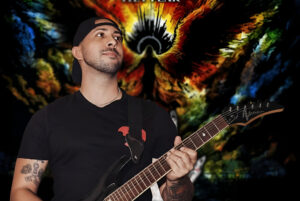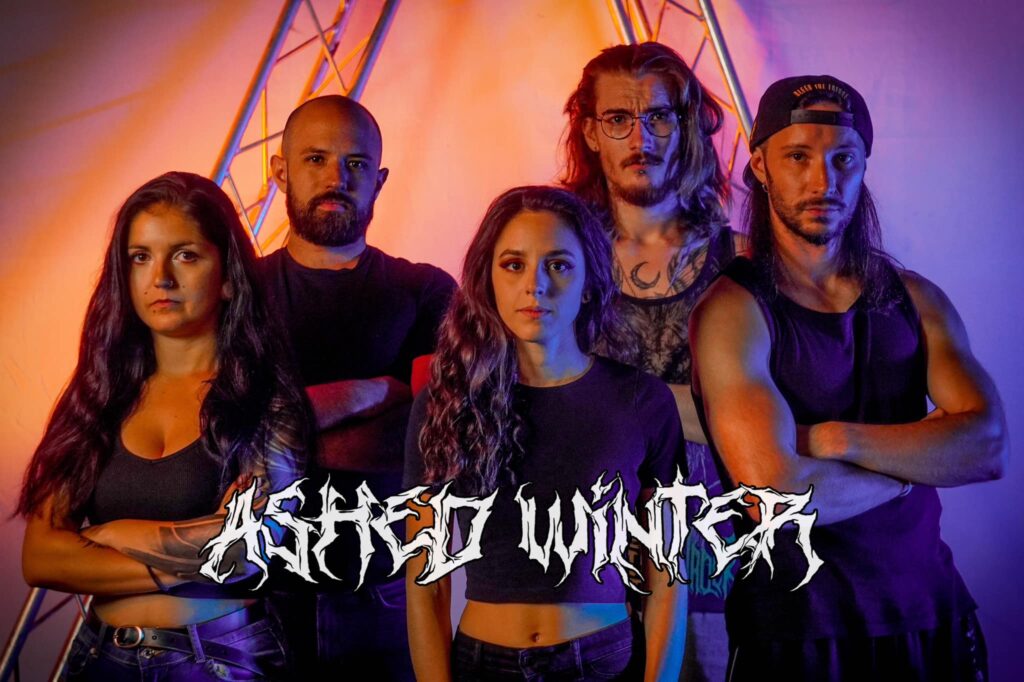
Si algo positivo tienen los algoritmos digitales es su capacidad de mostrarnos, de vez en cuando, alguna película, serie, videojuego o canción que sabe que nos gustará. Hace unas semanas, Spotify me sugería un álbum cuyo título atrapó mi atención: Papa Legba. Transportado de repente a las páginas de la novela El reino de este mundo, de Alejo Carpentier, y sus pasajes sobre religión vudú, ceremonias de tambores y deidades de origen africano, fue grande mi sorpresa al escuchar un sonido death/groove metal potente, moderno y pulido, con una sonoridad tribal. Y más grande fue al descubrir que Ashed Winter, la banda autora del disco, no era latinoamericana o caribeña, sino francesa, y que este Papa Legba, que tan bien me sonaba, era su álbum debut.
Intrigado por conocer más sobre su historia, influencias, inspiraciones y experiencias, contacté con el grupo vía Instagram, y después de haberse sorprendido de que su música llegara a oídos cubanos, concertamos esta entrevista. Grégory Barbéro, bajista y fundador de la banda, es quien nos cuenta quiénes son Ashed Winter, qué quieren transmitir y a dónde aspiran llegar.
¿Cómo surgió la idea de formar Ashed Winter? ¿Por qué este nombre?
Nuestro deseo de hacer música nos llevó a crear Ashed Winter. El nombre es una contracción en inglés de “c’était un hiver cendré”, que significa “fue un invierno con cenizas,” una referencia a las secuelas de un desastre nuclear.
¿Qué influencias musicales o experiencias personales los llevaron a decidirse por esta dirección sonora de metal con sonidos tribales?
La banda se nutre de una amplia variedad de influencias. Gojira, Sepultura y Alien Weaponry son algunas de ellas, además de la música tradicional de diversas culturas del mundo, lo que enriquece nuestro sonido tribal.
¿Cuál fue la primera canción o composición que crearon juntos como banda, y qué recuerdan de ese momento?
Nuestra primera composición, Eternal Warfare, fue un momento clave porque ya sentó las bases de nuestra identidad musical y temática. Con letras que denuncian la violencia humana y la repetición de conflictos, fue tanto cruda como introspectiva. Se convirtió en un verdadero manifiesto de lo que Ashed Winter llegaría a ser.
¿Qué los inspira a explorar temas como la naturaleza, la espiritualidad y lo tribal en sus letras y composiciones?
Estamos profundamente conectados con la humanidad, sus tradiciones y la diversidad cultural en todo el mundo. Al mismo tiempo, somos conscientes de los graves problemas causados por la humanidad. Cada uno de nosotros tiene el deber de proteger esta Tierra que nos alberga, junto con los pueblos originarios que aún viven en armonía con ella.
¿Qué papel juega la mitología o la conexión espiritual en su música, especialmente en trabajos como Papa Legba?
Papa Legba mezcla historia, misticismo y elementos tangibles. Esta canción refleja el sufrimiento causado por el comercio transatlántico de esclavos, mientras honra la cultura vudú adoptada por las comunidades locales. Imaginamos una historia en la que estas comunidades, tras un pacto con los Loa, superan este oscuro capítulo de la humanidad.
Para profundizar en la composición, el ritmo principal de la canción proviene de una oración ancestral hacia la deidad; toda la canción se compuso alrededor de este patrón, que a menudo se encuentra en documentales sobre el vudú. Además, como verás en «Ro’y Pituna», la canción está cantada en inglés y neengatú, ya que queríamos usar este idioma para transmitir un mensaje poderoso, intentando expresar las palabras de las tribus amazónicas.
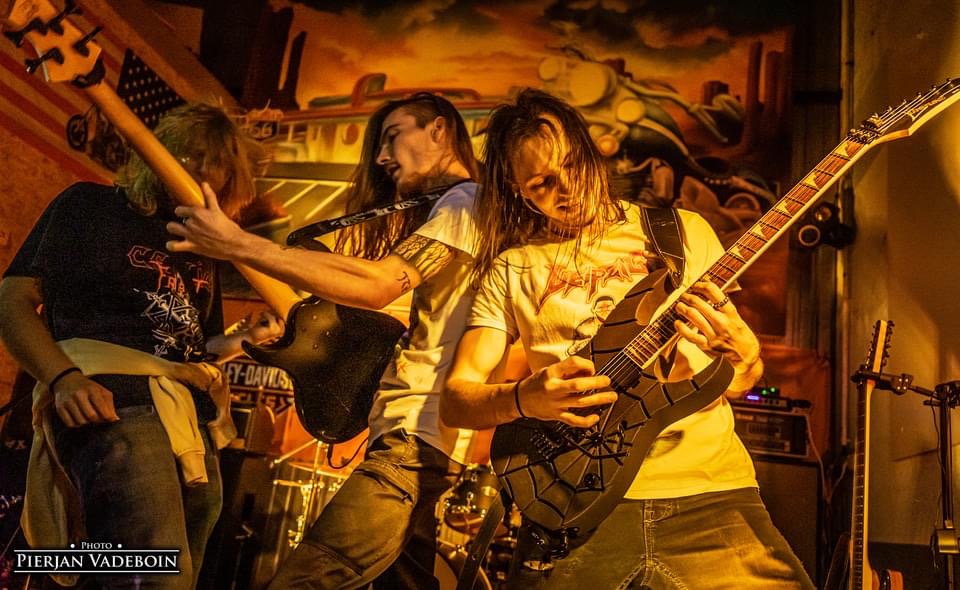
¿Cuáles son las dificultades más comunes de tener una banda de metal en Francia? ¿Existen suficientes espacios y festivales para bandas emergentes como ustedes?
Tocar en vivo es el mayor desafío. Hay demasiadas bandas para muy pocos lugares, y muchas aceptan tocar perdiendo dinero, lo que hace las cosas aún más difíciles. Además, los carteles suelen centrarse en 10 o 15 bandas conocidas, dejando poco espacio para los nuevos talentos.
Sin embargo, Francia tiene una cultura musical bien desarrollada, que ofrece una recepción de alta calidad para los músicos tanto en pequeños locales como en grandes escenarios. Somos conscientes de que este es un privilegio que no existe en todas partes.
Muchas personas creen que tener una vocalista femenina te abre muchas puertas y reduce las dificultades. ¿Creen que sea cierto? ¿Qué tanto ha sido así para ustedes desde el cambio de voz?
La idea de que una vocalista femenina facilita abrir puertas está muy extendida, pero necesita ser puesta en perspectiva. No es diferente de otros rasgos distintivos, como tener un miembro particularmente carismático o físicamente impresionante, lo que también puede atraer atención.
Por ejemplo, en Slaughter to Prevail, el carisma y la presencia física de Alex Terrible son activos evidentes para su éxito. Sin embargo, nadie insinúa que «los chicos ultracarismáticos enfrentan menos obstáculos», aunque esto podría ser cierto en ciertos contextos.

Para Ashed Winter, la llegada de Marie nunca se consideró una estrategia de marketing. Fue una decisión natural nacida de una afinidad humana y musical genuina. Su lugar en la banda se basa en su talento y conexión con nuestra visión artística, no en su género.
Dicho esto, la pregunta en sí misma es problemática porque tiende a reducir a las mujeres en la escena a su género en lugar de reconocer su valor artístico. Si ser mujer realmente eliminara obstáculos, no veríamos una subrepresentación tan marcada de mujeres en los rankings o en los grandes escenarios. Por ejemplo, en 2023, entre las 50 bandas de rock y metal más escuchadas en Spotify, solo una incluía mujeres. Esta cifra resalta los desafíos estructurales que enfrentan las mujeres en esta industria.
Sin embargo, es importante no adoptar una mentalidad de víctima. Sí, existen obstáculos, desde juicios injustos y mansplaining hasta comportamientos inapropiados, pero estos desafíos no definen a las mujeres en la escena. No son excepciones que deben ser celebradas por su género, sino artistas que deben ser valoradas por su trabajo y su impacto.
En última instancia, este debate no debería girar en torno a si una mujer canta o no, sino en torno a las dinámicas más amplias de la industria musical: la influencia de las redes, los recursos financieros y el buen marketing. Estos factores, y no el género, son a menudo los verdaderos impulsores del éxito o las dificultades de una banda.
Hace unos años, en un documental del antropólogo Sam Dunn, este destacaba a Gojira diciendo que Francia era un país conocido por no hacer buen metal. Sin embargo, bandas como Nocturnal Depression y Deathspell Omega son muy buenas, e incluso en Cuba han tocado también agrupaciones de ese país. En ese sentido, ¿cómo valoran al metal que se hace en Francia, y cuánto creen que ha evolucionado en las últimas décadas?
Contrario a quienes dicen que el metal está «muriendo», creemos que está más vivo que nunca. Con el auge de internet, la cultura es más accesible y están surgiendo muchos artistas. Hoy en día es mucho más fácil ganar reconocimiento en comparación con una época en la que había que luchar por conseguir tiempo al aire en una emisora de radio local.
Francia es un gran exportador de metal, con bandas como Gojira, Alcest, Landmvrks, Gorod e Igorrr. La calidad de la música producida en los últimos años es excepcional. Los músicos están llevando sus límites más lejos que nunca.
Hablando de Gojira, ¿qué impacto y significado tuvo su presentación en los Juegos Olímpicos para ustedes y para las bandas de metal de Francia?
Aunque su presentación con “Mea Culpa” fue más rock que metal, fue refrescante escuchar sobre el género sin los clichés habituales de los “depresivos incendiarios de iglesias” que empañan su imagen. Quizás algunas personas que nunca se atrevieron a escuchar metal ahora estén descubriendo álbumes que les encantan. ¡Esos nuevos oyentes podrían convertirse en el público de nuestros futuros conciertos!
¿Qué conocen sobre la escena del metal en América Latina y el Caribe? ¿Han encontrado similitudes entre las temáticas o estilos de su música y las bandas de esas regiones?
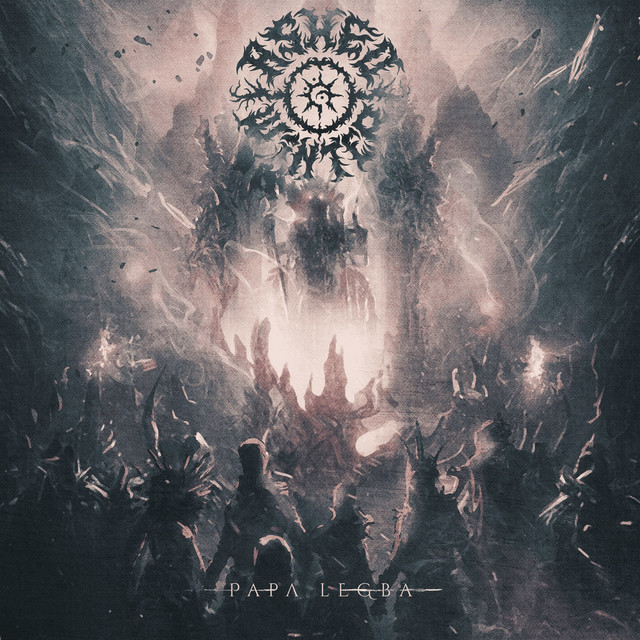
La escena del metal latinoamericano es una verdadera joya. Sepultura y Soulfly vienen a la mente. Compartimos similitudes en ciertos patrones rítmicos, lo que crea una conexión entre nuestra música.
Desde su primer proyecto hasta Papa Legba, ¿cómo sienten que ha evolucionado su música?
Creemos que hemos logrado crear una identidad musical distintiva. A menudo escuchamos que nuestra música no suena como ninguna banda en particular, sino simplemente como nuestra música. Entre nuestro EP The Prophecy y el álbum Papa Legba, el mayor cambio ha sido consolidar esta identidad sonora.
¿Qué momento ha marcado un antes y un después en la trayectoria de Ashed Winter?
La incorporación de Marie a la banda fue un momento clave. Coincidió con nuevas composiciones y un fuerte deseo de representar las culturas del mundo. Estos dos elementos se combinaron para dar forma al Ashed Winter que conoces hoy.
¿Cuál sería su mayor meta como banda?
Compartir nuestra música con la mayor cantidad de personas posible. Creamos para compartir. Nuestro sueño es vivir de nuestra música y tocar junto a los artistas que nos han inspirado durante años. ¡Ver nuestro nombre en un cartel junto a Gojira o Sepultura sería un verdadero logro para toda la banda!
¿Qué significa para ustedes ser una banda de metal en un mundo cada vez más dominado por géneros mainstream?
Como dice Sepultura: “Refuse, Resist” (Rechaza, Resiste). Mientras haya bandas creando metal y oyentes disfrutándolo, el género tendrá su lugar. Poco a poco, vemos que el metal entra en los medios de comunicación mainstream como los videojuegos, las películas y la televisión. Esto demuestra que su influencia sigue creciendo.
Ashed Winter: Tribal Metal from an Unexpected Place

If there’s one positive thing about digital algorithms, it’s their ability to occasionally show us a movie, series, video game, or song that they know we’ll like. A few weeks ago, Spotify suggested an album to me whose title caught my attention: Papa Legba. Suddenly transported to the pages of Alejo Carpentier’s novel El reino de este mundo (The Kingdom of This World) with its passages about Vodou religion, drum ceremonies, and Afro-Caribbean mythology, I was quite surprised when I heard a powerful, modern, and polished death/groove metal sound with tribal tones. And even more surprised to discover that Ashed Winter, the band behind the album, was not Caribbean or Latin American, but French, and that Papa Legba, which sounded so good, was their debut album.
Intrigued to learn more about their history, influences, inspirations, and experiences, I contacted the band through Instagram. After being surprised that their music had reached Cuban ears, we set up this interview. Grégory Barbéro, bassist and founder of the band, is the one who tells us who Ashed Winter is, what they aim to convey, and where they aspire to go.
How did the idea of forming Ashed Winter come about? Why did you choose this name?
Our desire to make music drove us to create Ashed Winter. The name is an English contraction of “c’était un hiver cendré”, meaning “it was an ashen winter,” a reference to the fallout of a nuclear disaster.
What musical influences or personal experiences led you to this direction of metal with tribal sounds?
The band draws from a wide range of influences. Gojira, Sepultura, and Alien Weaponry come to mind, as well as traditional music from various cultures around the world, which enriches our tribal sound.
What was the first song or composition you created together as a band, and what do you remember from that moment?
Our first composition, “Eternal Warfare”, was a key moment as it already laid the foundation for our musical and thematic identity. With lyrics denouncing human violence and the repetition of conflicts, it was both raw and introspective—a real manifesto for what Ashed Winter would become.
What inspires you to explore themes like nature, spirituality, and tribal elements in your lyrics and compositions?
We are deeply connected to humanity, its traditions, and the cultural diversity across the globe. At the same time, we are aware of the serious issues caused by humankind. Everyone has a duty to protect this Earth that shelters us, along with the autonomous peoples who still live in harmony with it.
What role does mythology or spiritual connection play in your music, especially in works like Papa Legba?
«Papa Legba» blends history, mysticism, and tangible elements. This song reflects the suffering caused by the transatlantic slave trade while honoring the voodoo culture adopted by local communities. We imagined a story where these communities, after a pact with the Loa, overcome this dark chapter of humanity.
To go further in the composition, the main rhythm of the song «Papa Legba» comes from an ancestral prayer to him, the whole song was composed around this pattern that is often found in documentaries about voodoo. Also, as you’ll see in Ro’y Pituna, the song is sung in English and Neenghatu, as we wanted to use this language to convey a strong message by trying to convey the words of the Amazon tribes. traduce
What are the most common challenges of having a metal band in France? Are there enough venues and festivals for emerging bands like yours?
Playing live is the biggest challenge. There are too many bands for too few venues, and many accept to play at a loss, making things even harder. Additionally, lineups often focus on 10 to 15 well-known bands, leaving little room for newcomers.
However, France has a well-developed music culture, offering high-quality reception for musicians in both small venues and major stages. This is a privilege we’re aware of, as it’s not the case everywhere.
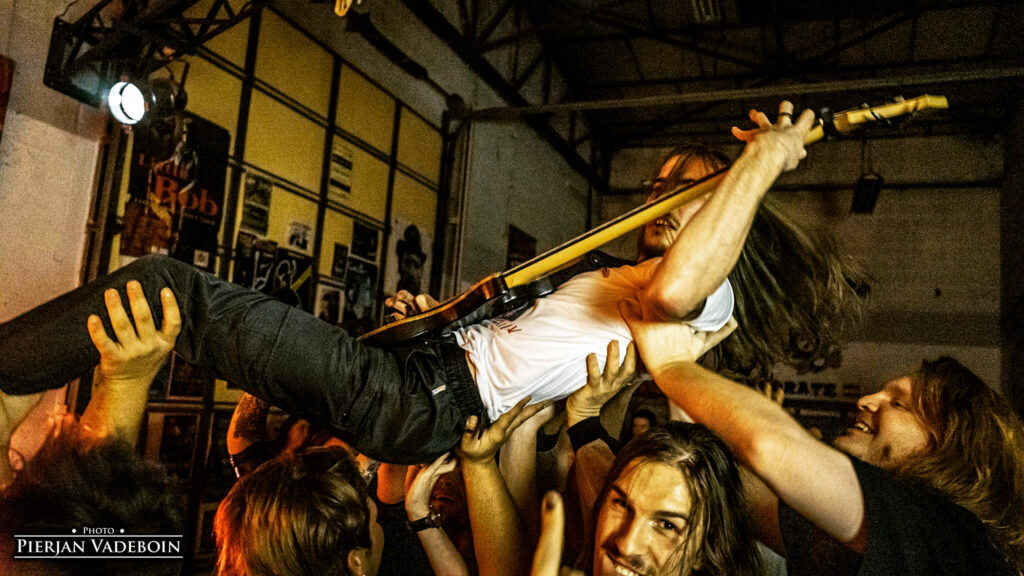
Many people think having a female vocalist opens doors and reduces challenges. Do you believe this is true? How has your experience been after the vocalist change?
The idea that a female vocalist makes it easier to open doors is widespread but needs to be put into perspective.
It’s no different from other distinctive traits, like having a particularly charismatic or physically impressive member, which can also draw attention.
Take Slaughter to Prevail, for example. The charisma and stature of Alex Terrible are obvious assets to their success. Yet no one implies that “ultra-charismatic guys face fewer obstacles”, even if this might be true in certain contexts.
For Ashed Winter, Marie’s arrival was never considered a marketing strategy. It was a natural decision born out of genuine human and musical affinity. Her place in the band is based on her talent and connection to our artistic vision, not her gender.
That said, the question itself is problematic as it tends to reduce women in the scene to their gender instead of recognizing their artistic value. If being a woman truly eliminated obstacles, we wouldn’t see such underrepresentation of women in rankings or on major stages.
For example, in 2023, among the 50 most-listened-to rock and metal bands on Spotify, only one featured female members. This figure highlights the structural challenges women face in this industry.
However, it’s important not to adopt a victim mindset. Yes, there are obstacles, from unfair judgments and mansplaining to inappropriate behavior, but these challenges don’t define the women in the scene. They are not exceptions to be celebrated for their gender but artists to be valued for their work and impact.
Ultimately, this debate should not revolve around whether a woman sings but rather around the broader dynamics of the music industry: the influence of networks, financial resources, and good marketing. These factors, not gender, are often the true drivers of a band’s success or struggles.
In a documentary by anthropologist Sam Dunn, Gojira was highlighted as an example of great metal from France, even though the country isn’t traditionally recognized as a major player in the genre. However, bands like Nocturnal Depression and Deathspell Omega have gained international recognition. Meanwhile, other French bands have performed in places like Cuba. How do you evaluate the metal being made in France today, and how do you think it has evolved over the past few decades?
Contrary to those who say metal is “dying,” we believe it’s more alive than ever. With the rise of the internet, culture is more accessible, and many artists are emerging. It’s much easier today to gain recognition compared to an era where you had to fight to get airtime on a local radio station.
France is a strong exporter of metal, with bands like Gojira, Alcest, Landmvrks, Gorod, and Igorrr. The quality of music produced in recent years is exceptional. Musicians are pushing their limits like never before.
Speaking of Gojira, what impact and significance did their Olympic Games performance have for you and other French metal bands?
Although their performance with “Mea Culpa” was more rock than metal, it was refreshing to hear about the genre without the usual clichés of “depressive church burners” that tarnish its image. Perhaps some people who never dared to listen to metal are now discovering albums they love. These new listeners might become the audience at our future concerts!
What do you know about the metal scene in Latin America and the Caribbean? Have you found similarities between their themes or styles and your music?
The Latin American metal scene is a real gem. Sepultura and Soulfly come to mind. We share similarities in certain rhythmic patterns, which creates a connection between our music.
From your first project to Papa Legba, how do you feel your music has evolved?
We believe we’ve succeeded in creating a distinct musical identity. We often hear that our music doesn’t sound like any particular band but simply like our music. Between our EP The Prophecy and the album Papa Legba, the biggest change has been solidifying this sonic identity.
What moment has marked a turning point in Ashed Winter’s trajectory?
Marie joining the band was a key moment. It coincided with new compositions and a strong desire to represent world cultures. These two elements combined to shape the Ashed Winter you know today.
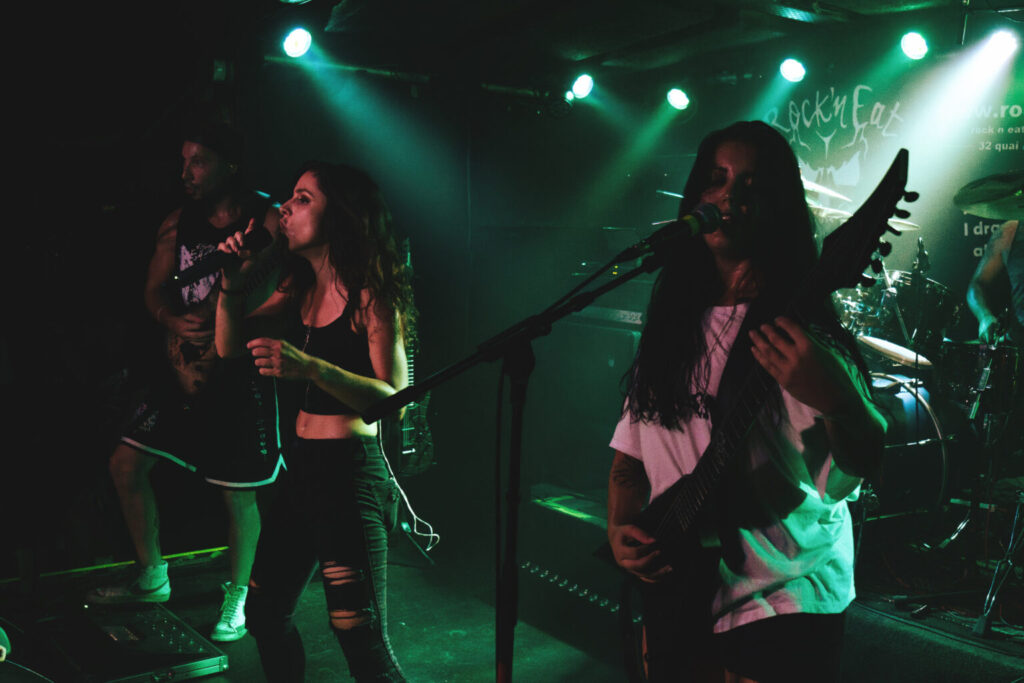
What would be your ultimate goal as a band?
To share our music with as many people as possible. We create to share. Our dream is to make a living from our music and play alongside the artists who have inspired us for years. Seeing our name on a poster next to Gojira or Sepultura would be a real achievement for the whole band.
What does it mean to you to be a metal band in a world increasingly dominated by mainstream genres?
As Sepultura says: “Refuse, Resist.” As long as there are bands creating metal and listeners enjoying it, the genre will have its place. Gradually, we see metal entering mainstream media like video games, movies, and television. This shows that its influence continues to grow.


